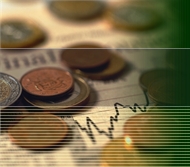An example of cash flow is your monthly salary. It is paid every bi-weekly or every month. Cash flow does not need to be always positive. If you pay it out, for example, your monthly credit card bill, that is the negative cash flow.
Cash flow is simply represented as following simple plot :

where the x-axis is the time, and the arrows represent the positive (meaning you get money) or the negative (meaning you pay out money) income.
Your daily financial activities and decisions are basically the activities and decisions of your cash flow. For example, by the 15th of each month, you get your salary. You actually signed up for this positive cash flow when you agreed to take the job. Another example is your mortgage. When you decide to buy a house, you bascially decide that you will have a negative cash flow for 30 years (except that, you have a rich dad that gives you a bunch of cash. Even in that case, we will explain later that it is wiser not to pay your house all in cash. You need to leverage your cash).
Now, you can see that buying a house actually does not necessarily get you richer. It actually takes away money from you on monthly basis (negative cash flow). You would argue that you will sell the house at a higher price. My question is : what are you going to live when you sell your house ? You will buy a larger house, which means that you will sign on to a even larger negative cash flow.
Not that buying a house is the wrong decision. The point is to understand what it means, how to measure your decision, and what's the alternative. First, let's understand how to measure the value of the cash flow, which leads us to the next topic : Interest Rate and Net Present Value.

